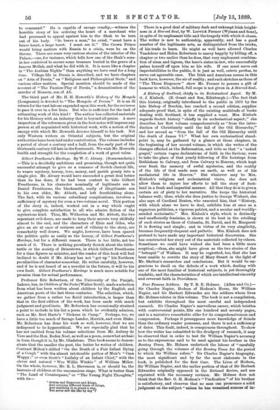A History of Scotland, chiefly in its Ecclesiastical Aspect. By
M. G. J. Kinloch. (R. Grant and Son, Edinburgh.)—The fact that this history, originally introduced to the public in 1873 by the late Bishop of Brechin, has reached a second edition, supplies. adequate proof that, in spite of the existing multitude of books dealing with Scotland, it has supplied a want. Mrs. Kinloch regards Scotch history "chiefly in its ecclesiastical aspect ;" she describes her first volume comprehensively as "from the intro- duction of Christianity until the fall of the Old Hierarchy," and her second as "from the fall of the Old Hierarchy until the death of James VI." What her own ecclesiastical stand- point is, may be gathered by a glance at those chapters, in the beginning of her second volume, in which she writes of the changes effected at the Reformation, and tells us that "a 'naked. gospel,' certain vague declarations of faith in the Saviour, were to take the place of that yearly following of His footsteps from Bethlehem to Calvary, and from Calvary to Heaven, which kept ever fresh the memory of awful mysteries, and the reality of the life of God made man on earth, as well as of hie mediatorial life in Heaven." But whatever may be Mrs. Kinloch's religious and ecclesiastical views, she does not allow them to injure her efforts to tell the story of Scot- land in a fresh and impartial manner All that they do is to give a. certain air of piety to her narrative. She keeps the historical balance well; thus, while she does justice to George Wishart, she also says of Cardinal Beaton, who executed him, that "History, with which alone we have to deal, exhibits him at once as a. sagacious politician, a vigorous patriot, and a secular and worldly- minded ecclesiastic." Mrs. Kinloch's style, which is distinctly and unaffectedly feminine, is shown at its best in the retelling of such stories as those of Columba, St. David, and St. Margaret' It is flowing and simple ; and in virtue of its very simplicity, becomes frequently eloquent and pathetic. Mrs. Kinloch does not pretend to have made any important historical discoveries. She has constructed her story out of the materials collected by others. Sometimes we could have wished she had been a little more sceptical,—thus, she might have given us the two stories of the " betrayal " of Wallace. It may be regretted, too, that she has been unable to rewrite the story of Mary Stuart in the light of Mr. Skelton's researches and conclusions. But it would be un- gracious to dwell on the defects of a work which, dealing with one of the most familiar of historical subjects, is yet thoroughly readable, and the characteristics of which are intellectual sincerity and reverent faith in Providence.


































 Previous page
Previous page